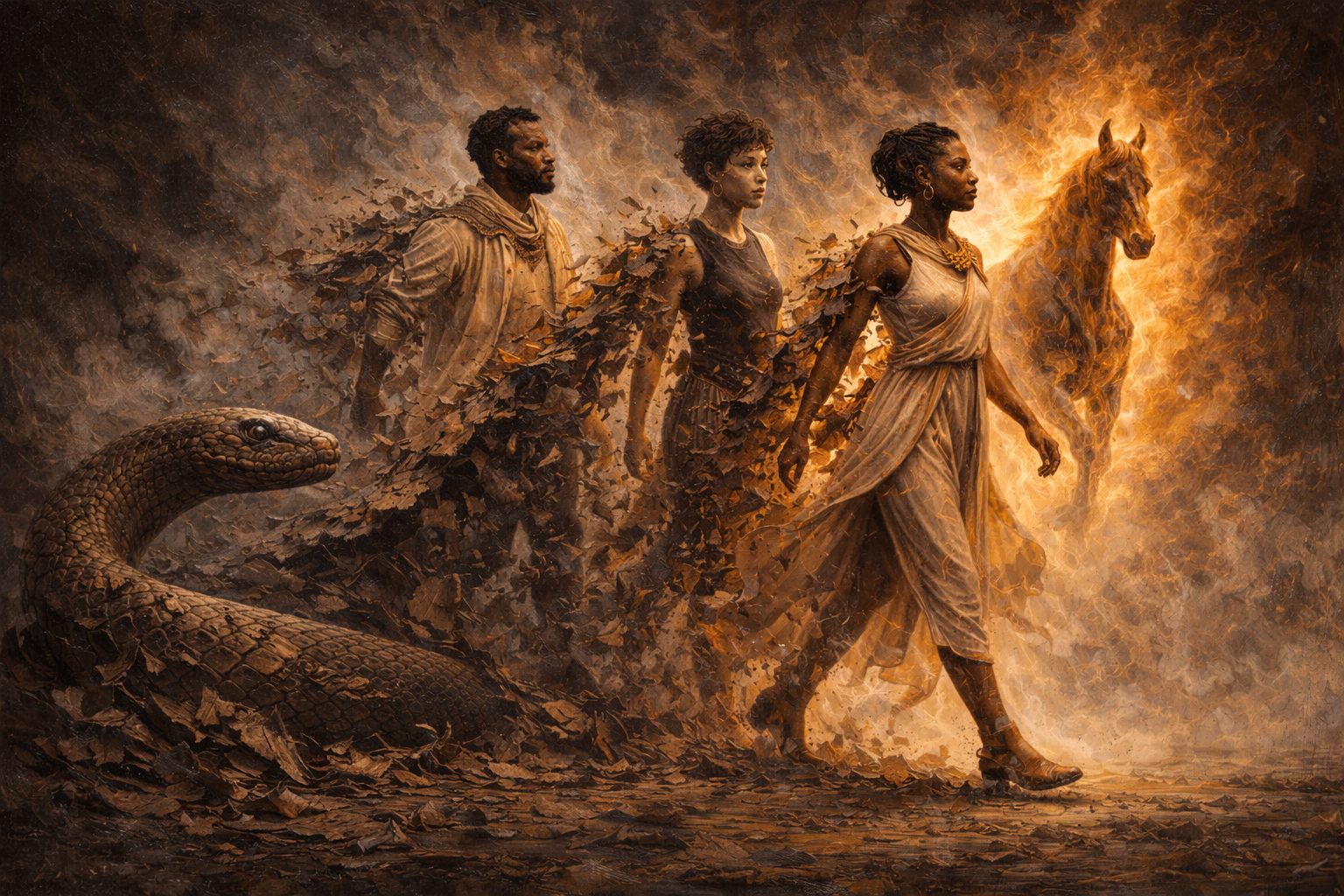Essays
The Molt & The Match
A year of completion exposed the cost of staying. Bodies reached their limit. Truth accelerated. The Molt & The Match is an editorial on shedding, alignment, and momentum—where endurance culture collapses, discernment takes over, and presence becomes the force that shapes what comes next.
The Gospel According To Us
A remembering is rising across the Diaspora — a reactivation of the spiritual technologies, cosmologies, and prophetic lineages that lived in African and Afro-Indigenous peoples long before the world distorted our reflection. This work confronts the systems that rewrote our God and confiscated our knowing — the church, the state, academia, the wellness industry — and reclaims the truth they tried to bury: that our intuition, divination, trance, ceremony, and ancestral communication were never superstition, but advanced technologies; that the Diaspora was never broken, only scattered; that our story may reach deeper into biblical lines than the world ever admitted. At its center is a personal awakening — the moment the Divine calls a woman back into her power — unfolding into a collective prophecy for a people returning to the Source that has always lived in them. It is defiant, mystical, and world-shaping: a gospel for those who carry both the beginning and the return.
Not of This Flesh
Not of This Flesh is a four-part ESSOESS essay that dismantles the lie that divinity lives above the body. Across theology, culture, and resistance, it reclaims the flesh as sacred ground — the site where spirit speaks, suffers, and survives. From scarification in Ethiopia to trans embodiment, from the politics of purity to the mysticism of Tantra and Ifá, this work challenges the Western obsession with transcendence and celebrates the holiness of being fully human. It is both a sermon and a revolt — a gospel for those who have been told to shrink, cover, or repent for existing.
In the end, Not of This Flesh reminds us: salvation isn’t about escaping the body. It’s about remembering that we were divine all along.
One Blood One Village
One Blood One Village is a manifesto for interdependence. Through the lens of prophecy turned praxis, it envisions Africa as the world’s body, the diaspora as its nervous system, and the village as its beating heart. What begins as revelation becomes instruction: to rebuild, to remember, to act. It is both requiem and roadmap — a testament to collective memory, radical interdependence, and the unbreakable architecture of love.
God, By Committee
There comes a moment when faith stops feeling like home and starts feeling like red tape. A moment when the room that once held you begins to shrink around your breath. In my new editorial, I confront the politics of holiness, the violence of control dressed up as devotion, and the God who keeps showing up in all the places they were told they shouldn’t. It’s a letter for the ones who left quietly, a mirror for the ones who stayed, and a door for the ones still searching for where God went after the meeting adjourned.
NeuroDivine
NeuroDivine reframes what the world calls disorder as sacred design.
Through lyrical storytelling and unflinching truth, ESS unveils her journey of realizing that the silence, the structure, the sensitivity — the very things misread as flaws — were the blueprint of a divine calling.
This is a revelation for every Black girl who’s ever been mislabeled, misunderstood, or made to feel like too much.
What if the traits they tried to fix were the gifts you were born to carry?
Rest Is the New Hustle
In a world that glorifies exhaustion as achievement, my story reveals a different gospel: that rest is not weakness but wealth, not failure but faith. This essay traces how collapse, sacrifice, and stillness became the most radical movement of my life.
Reflections
What does emptiness taste like?
I entered my fortieth year not with cake or champagne, but with water — seven days of emptiness that became its own threshold. What began as a fast to calm flare, anemia, and chronic stomach unrest turned into a confrontation with everything I thought I could carry. Reflections is the story of how hunger gave me vision, and how stillness made me whole.
I Asked for Everything, and Everything Asked for Me
I Asked for Everything, and Everything Asked for Me is a raw, unflinching meditation on sacrifice, desire, and becoming. Written on the threshold of my 40th year and the 8-8 portal, this piece is both confession and coronation — a story of the love, comfort, and identities I’ve released to make space for the life I demanded from the Universe. Anchored by the ritual of a 7-day water fast, it’s about what it truly means to meet your next era clear, ready, and unshakable.
The Devil You Name is the God You Forgot
A raw, spiritually charged reckoning that exposes how prophetic gifts—especially within Black communities—have been demonized by fear, colonization, and religious control. This piece reclaims the power of ancestral intelligence, Afro-Caribbean spiritual traditions, and embodied knowing, while challenging those who mistake divinity for danger. It is both a remembrance and a return: to the oracle, to the altar, and to the voice that never needed permission to speak.
The Blood of the Covenant is Thicker than the Water of the Womb
"Blood is thicker than water" was never the full story. This is about the covenant bonds forged in spirit, not womb—how some strangers come carrying the medicine your family never could. It’s about the holy weight of choosing yourself, the grief of walking away, and the miracle of being held by those who were never asked to but did anyway. This is family, reborn.
I Found Me Inside Her
A personal, spiritual coming out told through memory, mirror, and fire. This piece reclaims queerness as sacred, sensual, and sovereign—not deviation, but destiny. Published with love, pride, and provocation. Happy Pride 🏳️🌈
Confidently Lost
Some journeys don’t start with a map. They begin with a feeling—an urgency, a hunger, a pull. This is about honoring the detour, trusting the timing, and letting the unknown shape you. It’s about the beauty of walking roads that twist, double back, and still somehow lead exactly where you’re meant to be. A reflection on movement, memory, and the quiet power of becoming.
I Remember Me, Before You Told Me Who I Was
She was sacrificed. She was crowned. She was dismissed. She was Divine. The memory reassembled itself—precise, unrelenting, and impossible to ignore.
Not Your Version of Black
What we were taught to fear in each other—and in ourselves—was never ours to carry. This piece explores how honoring the full, sacred spectrum of Black identity becomes an act of ancestral fidelity, spiritual liberation, and collective healing.
Just Because You Came Doesn’t Mean You Arrived
An uncompromising revelation on orgasm as prophecy, power, and presence. Rooted in ancestral wisdom, spiritual eroticism, and personal resurrection, these words unravel the politics of pleasure and reframe ecstasy as sacred memory. A manifesto for those ready to feel on purpose—and come home to themselves.
Redemption Song
An exploration of the afterlife of ancestral sound, Redemption Song explores the spiritual legacy encoded in music, memory, and resistance. It’s instruction. A portal through which song becomes strategy, and remembering becomes action.
Where Are You Landing?
Where Are You Landing traces the intelligence of movement, memory, and return. It speaks to those who navigate by ancestral instruction—who move with timing shaped by memory and arrive where recognition meets readiness.
This is presence as power.
This is motion as method.
This is home as alignment.
Open Legs, Open Portals
When the body opens, it doesn’t just invite touch—it initiates transformation. This piece traces the spiritual, psychological, and ancestral impact of sex, cutting through shame, and disconnection to ask: What are you really letting in? An excavation of erotic memory, energetic residue, and sacred discernment.
I Did It On Purpose
A meditation on purpose, power, and becoming. Through sharp prose and intimate truths, this piece explores what it means to live intentionally, especially when your path doesn’t look like anyone else’s. From unlearning survival scripts to reclaiming sacred callings, it’s a love letter to those who are still becoming—and doing it on purpose.



















